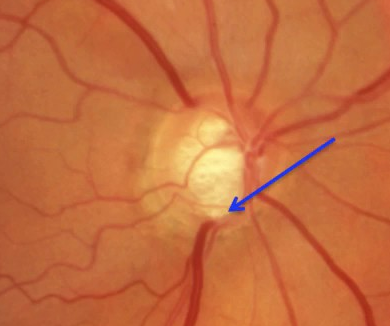Optic disc cupping Meaning
Optic disc cupping is a condition that occurs when the optic nerve head, which is the point where the optic nerve enters the eye, appears to have a depression or a concave shape. This depression is called the cup and is a normal feature of the optic disc. However, when the cup becomes larger, it can indicate the development of certain eye diseases, such as glaucoma.
In glaucoma, the pressure inside the eye increases, which can damage the optic nerve and lead to vision loss. As the damage progresses, the cup becomes larger and deeper. Therefore, the measurement of the cup-to-disc ratio is an important diagnostic tool for assessing the severity of glaucoma and monitoring its progression.
Optic disc cupping Symptoms
Optic disc cupping itself does not cause any symptoms. In fact, it is often detected during a routine eye exam by an ophthalmologist or optometrist who is looking for signs of eye disease.
However, optic disc cupping can be a sign of an underlying eye condition, such as glaucoma. Glaucoma is a progressive eye disease that can cause damage to the optic nerve and lead to vision loss if left untreated. Symptoms of glaucoma may include:
- Blurred or hazy vision
- Loss of peripheral vision (side vision)
- Difficulty adjusting to dark rooms
- Halos around lights
- Eye pain or redness

Optic disc cupping Causes
Optic disc cupping can be caused by several underlying eye conditions, including:
Glaucoma
The most common cause of optic disc cupping is glaucoma, a group of eye diseases that damages the optic nerve, often due to elevated pressure within the eye. As glaucoma progresses, the cup-to-disc ratio increases, and the cup becomes deeper and wider.
Optic neuropathy
Optic neuropathy refers to any damage to the optic nerve that impairs its function. This condition can cause optic disc cupping, among other symptoms.
Optic nerve head drusen
Optic nerve head drusen is a condition in which small calcified deposits accumulate in the optic nerve head. This can lead to a small or large cup-to-disc ratio, depending on the number and location of the deposits.
Optic disc edema
Optic disc edema is a swelling of the optic disc, often caused by increased pressure within the skull or inflammation in the eye. This condition can cause a shallow cup-to-disc ratio.
Other conditions
Rarely, other conditions such as retinal detachment, retinal vein occlusion, and optic neuritis can cause optic disc cupping.
Optic disc cupping Treatment
The treatment for optic disc cupping depends on the underlying condition causing the cupping. Here are some common treatments for the most common cause of optic disc cupping, glaucoma:
Medications
Eye drops or oral medications can be prescribed to lower intraocular pressure (IOP), which can slow or halt the progression of glaucoma.
Laser therapy
Laser trabeculoplasty is a type of laser therapy that can be used to open up drainage channels in the eye, which can help lower IOP.
Surgery
Trabeculectomy is a surgical procedure that can help lower IOP by creating a new drainage channel in the eye.
Regular eye exams
Regular eye exams are important for monitoring the progression of optic disc cupping and glaucoma, and adjusting treatment as needed.
Optic disc cupping vs Normal
The optic disc is the part of the retina where the optic nerve exits the eye. In a normal optic disc, there is a central area called the "optic cup," which is a small depression in the center of the disc. In a healthy eye, the size of the optic cup is smaller than the size of the optic disc.
In contrast, in optic disc cupping, the size of the optic cup is enlarged and the edges of the cup become more pronounced, while the optic disc itself may appear thinner. Optic disc cupping is a sign of damage to the optic nerve and can be caused by several conditions, including glaucoma, optic neuropathy, and optic nerve head drusen.
